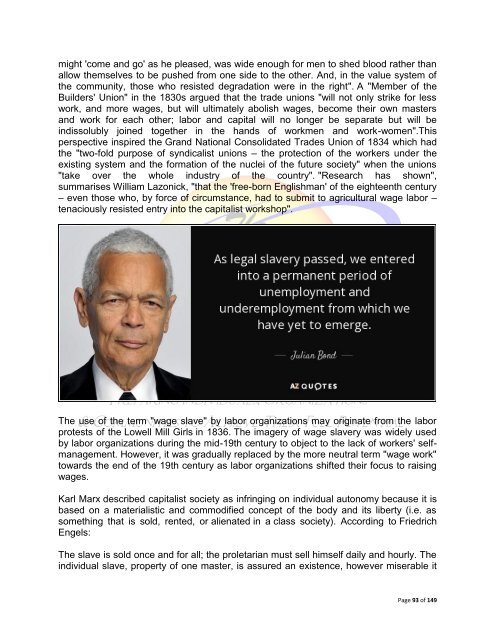Hidden Unemployment
Hidden Unemployment
Hidden Unemployment
Create successful ePaper yourself
Turn your PDF publications into a flip-book with our unique Google optimized e-Paper software.
might 'come and go' as he pleased, was wide enough for men to shed blood rather than<br />
allow themselves to be pushed from one side to the other. And, in the value system of<br />
the community, those who resisted degradation were in the right". A "Member of the<br />
Builders' Union" in the 1830s argued that the trade unions "will not only strike for less<br />
work, and more wages, but will ultimately abolish wages, become their own masters<br />
and work for each other; labor and capital will no longer be separate but will be<br />
indissolubly joined together in the hands of workmen and work-women".This<br />
perspective inspired the Grand National Consolidated Trades Union of 1834 which had<br />
the "two-fold purpose of syndicalist unions – the protection of the workers under the<br />
existing system and the formation of the nuclei of the future society" when the unions<br />
"take over the whole industry of the country". "Research has shown",<br />
summarises William Lazonick, "that the 'free-born Englishman' of the eighteenth century<br />
– even those who, by force of circumstance, had to submit to agricultural wage labor –<br />
tenaciously resisted entry into the capitalist workshop".<br />
The use of the term "wage slave" by labor organizations may originate from the labor<br />
protests of the Lowell Mill Girls in 1836. The imagery of wage slavery was widely used<br />
by labor organizations during the mid-19th century to object to the lack of workers' selfmanagement.<br />
However, it was gradually replaced by the more neutral term "wage work"<br />
towards the end of the 19th century as labor organizations shifted their focus to raising<br />
wages.<br />
Karl Marx described capitalist society as infringing on individual autonomy because it is<br />
based on a materialistic and commodified concept of the body and its liberty (i.e. as<br />
something that is sold, rented, or alienated in a class society). According to Friedrich<br />
Engels:<br />
The slave is sold once and for all; the proletarian must sell himself daily and hourly. The<br />
individual slave, property of one master, is assured an existence, however miserable it<br />
Page 93 of 149

















